Related Research Articles
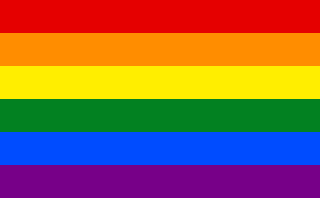
LGBT is an initialism that stands for lesbian, gay, bisexual, and transgender. In use since the 1990s, the initialism, as well as some of its common variants, functions as an umbrella term for sexuality and gender identity.
LGBT History Month is an annual month-long observance of lesbian, gay, bisexual and transgender history, and the history of the gay rights and related civil rights movements. It was founded in 1994 by Missouri high-school history teacher Rodney Wilson. LGBT History Month provides role models, builds community, and represents a civil rights statement about the contributions of the LGBTQ+ community. As of 2022, LGBT History Month is a month-long celebration that is specific to Australia, Canada, Cuba, Finland, Germany, Hungary, Italy, the United Kingdom and the United States.
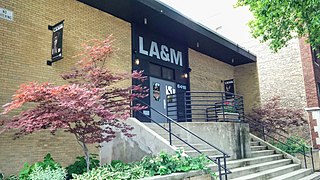
The Leather Archives & Museum (LA&M) is a community archives, library, and museum located in the Rogers Park neighborhood of Chicago. Founded by Chuck Renslow and Tony DeBlase in 1991, its mission is "making leather, kink, BDSM, and fetish accessible through research, preservation, education and community engagement." The LA&M is a leading conservator of queer erotic art. Its permanent collection features some of the most iconic LGBT artists of the twentieth century, including the complete works of Bill Schmeling and many of Dom Orejudos' drawings and murals.
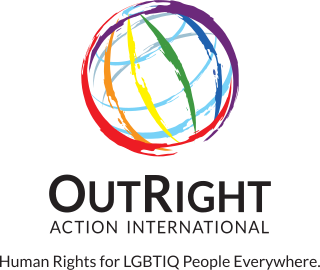
OutRight International (OutRight) is an LGBTIQ human rights non-governmental organization that addresses human rights violations and abuses against lesbian, gay, bisexual, transgender and intersex people. OutRight International documents human rights discrimination and abuses based on their sexual orientation, gender identity, gender expression and sex characteristics in partnership with activists, advocates, media, NGOs and allies on a local, regional, national and international level. OutRight International holds consultative status with ECOSOC.
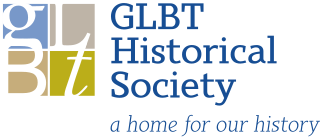
The GLBT Historical Society maintains an extensive collection of archival materials, artifacts and graphic arts relating to the history of LGBT people in the United States, with a focus on the LGBT communities of San Francisco and Northern California.

The Jean-Nickolaus Tretter Collection in Gay, Lesbian, Bisexual and Transgender Studies is a collection of LGBT historical materials housed in the Special Collections and Rare Books section of the University of Minnesota Libraries. It is located underground in the Elmer L. Andersen special collections facilities on the University of Minnesota's Minneapolis campus. The Tretter Collection houses over 40,000 items, making it the largest LGBT archive in the Upper Midwest and one of the largest GLBT history collections in the United States. The collection, which was created by Jean-Nickolaus Tretter, is international in scope and is varied in media.
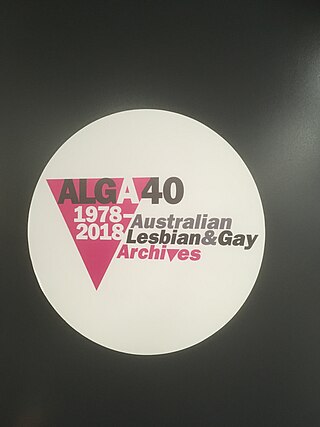
The Australian Queer Archives (AQuA) is a community-based non-profit organisation committed to the collection, preservation and celebration of material reflecting the lives and experiences of lesbian, gay, bisexual, transgender and intersex LGBTI Australians. It is located in Melbourne. The Archives was established as an initiative of the 4th National Homosexual Conference, Sydney, August 1978, drawing on the previous work of founding President Graham Carbery. Since its establishment the collection has grown to over 200,000 items, constituting the largest and most significant collection of material relating to LGBT Australians and the largest collection of LGBT material in Australia, and the most prominent research centre for gay, lesbian, bisexual, trans and intersex history in Australia.
JD Doyle is an American LGBT music and history archivist/historian and radio producer. He is a staff member of the weekly radio show Queer Voices and produces the monthly radio shows Queer Music Heritage and OutRadio. He now lives in Houston, Texas.
The Gay, Lesbian, Bisexual, Transgender and Straight Alliance (GLBTSA) of the University of North Carolina at Chapel Hill is the largest LGBTIQ student organization in the Southeastern United States. GLBTSA sponsors the annual Southeast Regional Unity Conference as well as Lambda magazine, the nation's oldest LGBTIQ student publication. The general body holds weekly meetings as well as guest speakers, drag shows, retreats, trips, and service projects. GLBTSA has three additional programs: Colors, Committee for a Queerer Carolina (activism), and Fruit Bowl (social).

The June L. Mazer Lesbian Archives is a grass roots archive dedicated to collecting, protecting, and conserving lesbian and feminist women's history. The Archives was founded in 1981 as the West Coast Lesbian Collections (WCLC) by Lynn Fonfa and Cherrie Cox in Oakland, California.
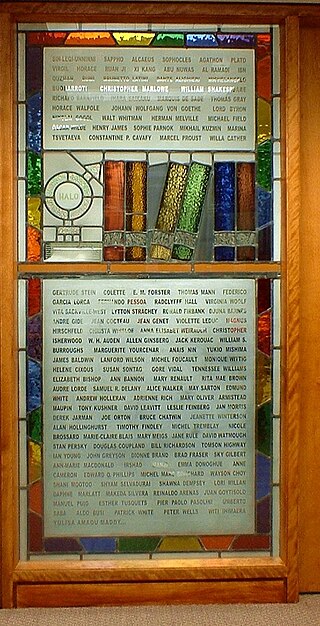
In the post-Stonewall era, the role of libraries in providing information and services to LGBTQ individuals has been a topic of discussion among library professionals. Libraries can often play an important role for LGBTQ individuals looking to find information about coming out, health, and family topics, as well as leisure reading. In the past 50 years, advocate organizations for LGBTQ content in libraries have emerged, and numerous theorists have discussed various aspects of LGBTQ library service including privacy concerns, programming, collection development considerations and librarian/staff education needs, as well as special services for juvenile and teen patrons.
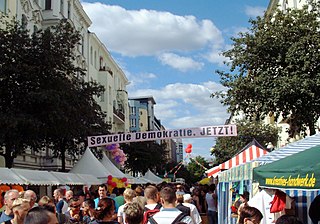
Berlin was the capital city of the German Empire from 1871 to 1945, its eastern part the de facto capital of East Germany from 1949 to 1990, and has been the capital of the unified Federal Republic of Germany since June, 1991. The city has an active LGBT community with a long history. Berlin has many LGBTIQ+ friendly districts, though the borough of Schöneberg is widely viewed both locally and by visitors as Berlin's gayborhood. Particularly the boroughs North-West near Nollendorfplatz identifies as Berlin's "Regenbogenkiez", with a certain concentration of gay bars near and along Motzstraße and Fuggerstraße. Many of the decisive events of what has become known as Germany's second LGBT movement take place in the West Berlin boroughs of Charlottenburg, Schöneberg, and Kreuzberg beginning in 1971 with the formation of the Homosexuelle Aktion Westberlin (HAW). Where as in East Berlin the district of Prenzlauer Berg became synonymous with the East Germany LGBT movement beginning in 1973 with the founding of the HIB. Schöneberg's gayborhood has a lot to offer for locals and tourists alike, and caters to, and is particularly popular with gay men. Berlin's large LGBT events such as the Lesbian and Gay City Festival, East Berlin Leather and Fetish Week, Folsom Europe, and CSD center around Schöneberg, with related events taking place city-wide during these events. Nevertheless, with roughly 180 years of LGBTIQ+ history, and a very large community made up of members with very varied biographies, it is hard to find a place in Berlin completely without LGBT culture past or present. Berlin's present-day neighborhoods with a certain concentration of LGBTIQ+ oriented culture vary somewhat in terms of history, demography, and where the emphasis in each neighborhoods' queer culture falls along the LGBTIQ+ spectrum. Over the course of its nearly two centuries of queer history (herstory), definitions not with standing, Berlin's LGBTIQ+ culture has never ceased to change, not only in appearance and self-understanding, but also in where the centers of queer culture were located in the city. What is true about Berlin's "LGBT culture in Berlin" at one point in time, in a given place and from a given perspective, is almost certainly different the next.

IHLIA LGBT Heritage, formerly known as the International Gay/Lesbian Information Center and Archive, is an international archive and documentation center on homosexuality, bisexuality and transgender. It collects, preserves and presents to the public all kinds of information in the field of LGBT. IHLIA curates the largest LGBT collection of Europe with over 100,000 titles on 1515 meters of shelf length – books, journals and magazines, films, documentaries, posters, photographs and objects such as T-shirts, buttons and condom packaging. IHLIA was founded in 1999 by merging the Homodok and the Lesbian Archives of Amsterdam and Leeuwarden. Since 2007, IHLIA is located in the Public Library Amsterdam. IHLIA and the George Mosse Fund organize the annual Mosse Lectures. Over 95% of their annual budget, about 800.000 euros, comes from the country's government. They are 14 employees, almost all part-time. The biggest part of their LGBT archives collection is in fact hosted at International Institute of Social History, in Amsterdam too.

Quatrefoil Library is a member-supported, 501(c)(3) non-profit library and community center for the lesbian, gay, bisexual, and transgender community. It is located in Minneapolis, Minnesota, where it was founded by David Irwin and Dick Hewetson in 1983. It is the second LGBT lending library in the United States. In the beginning, it was not only an educational resource center but also a safe space for LGBT people. The library houses over 15,000 books, 7,000 DVDs, a collection of first editions and rare books, and books in braille. It hosts poetry readings, panel discussions, book launches, and other events, open to all.

Twin Cities Pride, also known as Twin Cities GLBT Pride, is a nonprofit organization which runs an annual celebration in the Twin Cities of Minneapolis and St. Paul, Minnesota every June focusing on the LGBT community.
The following is a timeline of lesbian, gay, bisexual, transgender and queer (LGBTQ) journalism history.
Richard LaFortune, also known as Anguksuar, , is a two spirit activist, author, community organizer, and artist based in Minneapolis, Minnesota. LaFortune was an early organizer of the Native American LGBT community in the 1980s and co-founded the Two Spirit Press Room (2SPR).
The Forum Queeres Archiv München in Munich, Germany, is an association and archive with collections focusing on LGBTQ+ history and culture in Munich, Bavaria and Germany. It opened in 1999 and was named forum homosexualität münchen – Lesben und Schwule in Geschichte und Kultur e.V. till 2019.

Jean-Nickolaus Tretter was an American activist and LGBT archivist who created the Jean-Nickolaus Tretter Collection in Gay, Lesbian, Bisexual and Transgender Studies, housed by the University of Minnesota.
References
- ↑ "About | LGBTQ+ Archives, Libraries, Museums and Special Collections". lgbtqalms.co.uk. Retrieved 2017-05-02.
- ↑ "ALMS 2019 Berlin: Queering Memory. Archives, Libraries, Museums und Special Collections: An International LGBTIQ+ Conference". schwulesmuseum.de/presseaktuell/alms-conference-berlin-2019/?lang=en. Retrieved 2019-08-07.
- 1 2 3 "GLBT ALMS 2006 Conference Program". GLBT ALMS 2006 Conference Program. 2006.
- ↑ Keim, Adam (2011). History of the Quatrefoil Library. Golden Valley, MN: Friends of the Bill of Rights Foundation. p. 103. ISBN 978-0-9668828-2-7.
- ↑ Greenblatt, Ellen (2011). Serving LGBTIQ library and archives users : essays on outreach, service, collections and access. Jefferson, North Carolina: McFarland and Company. p. 147. ISBN 9780786448944.
- ↑ "Andersen Library hosts international GLBT materials archiving conference". Minnesota Daily. 2006-05-24. Archived from the original on 2016-08-12. Retrieved 2016-06-18.